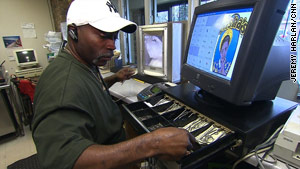2 Arkansas men reflect national divide over health reform
- Restaurant owner Stanley Walker has diabetes and can't afford all his medication
- Walker says his vote is going to politicians who support public option
- Brake shop owner Larry Levy sees disaster if Democratic vision prevails
- Caught in the middle is Sen. Blanche Lincoln, whose caution displeases both sides
Pine Bluff, Arkansas (CNN) -- Aisha's Fish and Chicken is named for Stanley Walker's 16-year-old daughter; it's a small family business known for its wings, catfish and signature sauce.
Walker's daughter, wife, Demetria, and cousin, Andrew, keep the restaurant running, and in this bad economy, times are tough. Health care coverage is out of the question.
"It's too expensive right now," Walker said. "We are having trouble keeping our head above water. ... We had it at one time, but it was so expensive that we finally dropped it."
With a smile, Walker continues: "I get lots of grief from my wife about it -- that we don't have health care.''
Humor aide, it is for Stanley Walker both a business decision and a huge personal risk. He has diabetes, and takes just half of his four pills a day prescription because he can't afford the $500 a month bill for the full dose.
He knows the risks, and tries to watch his diet and closely monitor his blood pressure.
"I work by myself a lot, and I am always moving all the time. I don't want to get somewhere and get into a coma because my sugar dropped too low," Walker told us. "This is a situation where you actually take a gamble, but you can't afford not to."
Walker is keeping tabs on the health care debate in Washington when he can and hopes for a bill that lowers costs and creates a new government-run public insurance option. "If they don't do that, then I don't think I'd vote for them."
It is an important statement because African American votes in places such as Pine Bluff will be critical in next year's midterm elections, when Democratic Sen. Blanche Lincoln faces a tough re-election race.
Lincoln has said she opposes the public option and is concerned about the costs of the Democratic health care bills. But her cautious position, which she says reflects the views of fellow Arkansans, isn't enough to scare Republican candidates away.
More than a half-dozen have expressed interest in the race, and Lincoln's poll numbers show vulnerability even before the difficult terrain of the health care debate.
"No question, they see an opportunity here, and an opportunity to win a Senate seat doesn't come often for Republicans in Arkansas," says University of Arkansas at Little Rock political scientist Art English.
The pressures on Lincoln are from all sides: progressive Democrats are frustrated she isn't fully supporting President Obama's health care goals; but she has to also worry about conservative Democrats and independents in a state Obama lost last year by 20 points.
"It's tough," English said. "It's like that show 'Malcolm in the Middle.' But this time, it is kind of Sen. Blanche Lincoln in the middle, in that sense it's been tough on her."
A visit to a Little Rock brake shop owned by Larry Levy helps illustrates the counterweight to Walker's insistence that Lincoln support the public option and the broad Democratic health care goals.
Levy a few years back paid 100 percent of health care premiums for his four employees; he now pays 60 percent.
"It kept going up. And as my employees got older, premiums they got so high, we just couldn't realistically afford it," Levy told us during a break from his work.
He would love for Congress to take steps to lower health care costs, and lists tort reform among his priorities. But he sees disaster in Democratic calls for a public option, or a mandate that employers or individuals be required to buy health insurance.
"We don't know what it is going to cost us," Levy said. 'We have health issues, I agree. There needs to be reform. But let's identify the problems that we have and let's fix those problems. Let's just don't throw out everything and start over."
Levy is among the many here who just don't believe Democratic promises to lower costs and the deficit, and limit any tax increases to those making more than $250,000 a year.
"No I don't. I don't buy it," Levy said. "We middle class people, we'll shoulder the burden. I have no question about that."
Levy describes himself as a conservative who did not vote for Obama but does often vote for conservative Democrats here in Arkansas. But he is not a fan of Lincoln.
"She is playing games right now I think," Levy said of Lincoln's cautious stance on health care. "You know she is just kind of swaying back and forth. I know she's in a tough position, but if she will listen to her constituents, we don't want her to vote for this I think. ... I think she needs to listen if she want to keep her job."
In Levy's case, Lincoln has already lost. Regardless of how she handles the health care debate, he says the early days of the Obama administration have him convinced his vote in the midterm elections should go to Republicans who voice the goal of putting the brakes on the Obama agenda.

